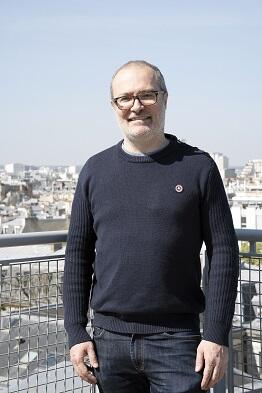
Gwendal Fève
Academic Researcher in Physics Awarded an ERC Grant
This grant is a real breath of fresh air so you work with greater peace of mind.
This is a story about good vibes between two people, and it also sums up Gwendal Fève's research work on the flow of electricity. At 45 years old, he’s a professor at Sorbonne University and a researcher in the mesoscopic physics group at the ENS physics laboratory. His speciality: testing the manifestations of quantum physics in the transport of electric current in nanoconductors.
“To put it in layman's terms, I evaluate the effects of the phenomenon of interference between electronic waves that meet in electrical conductors similar to the transistors in our computers," says Gwendal Fève.
While studying physics at the Ecole normale supérieure de Cachan (now ENS Paris-Saclay), Gwendal Fève set his sights on quantum physics, a set of theories describing the behaviour of particles and atoms on a microscopic scale. The young student was passionate about applying these concepts to electronics. He spent a year and a half doing an internship at Stanford University in California, before writing his thesis on the subject.
A field of study that began in the 1980s and has continued to develop ever since. “We know how to characterise the effects of quantum physics on the behaviour of microscopic objects, such as a single atom, with extreme precision. However, the effects of quantum physics on more complex objects, made up of a very large number of particles, are more difficult to predict. This is precisely the situation encountered when studying the transport of electric current in a conductor, an electronic chip a few tens of microns in size containing around a million electrons", explains the researcher.
“These conditions bring about competition between the effects of quantum physics, which cause the electrons to behave in a wave-like manner, giving rise to the phenomenon of interference, and the effects of interactions between electrons, which, on the contrary, tend to suppress this phenomenon and restore classical behaviour." The effects of interactions can also considerably enrich this subject, by giving rise to new particles that do not exist in dilute matter. "These experiments allow us to understand how matter works when the interactions between electrons are very strong."
Winning the Prix Ancel in 2020
Gwendal Fève has received awards for his research work. In 2020, he was awarded the Prix Ancel by the Société française de physique (SFP) (site in French) awarded each year to a physicist under the age of 45 for their work on condensed matter. He presented a body of work based on experiments on the wave nature of electrons. To take his research further, Gwendal Fève needs funding, which is true of many researchers.
In March 2023, following two rounds of a selection process, he was awarded the ERC Advanced Grant, a European scholarship worth approximately €2.5 million that will provide him with a financial windfall for his research projects over the next five years. “I recognise that this grant helps us to work with greater peace of mind," he says with satisfaction. “This will enable our laboratory to acquire cutting-edge equipment and take on new staff, whether it’s doctoral students or young researchers. It's a real breath of fresh air."
